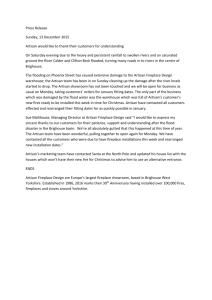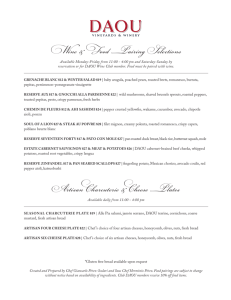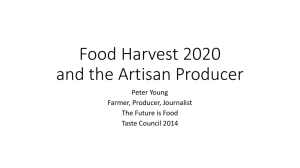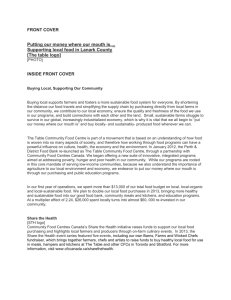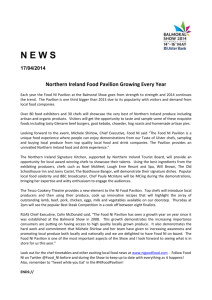1
advertisement
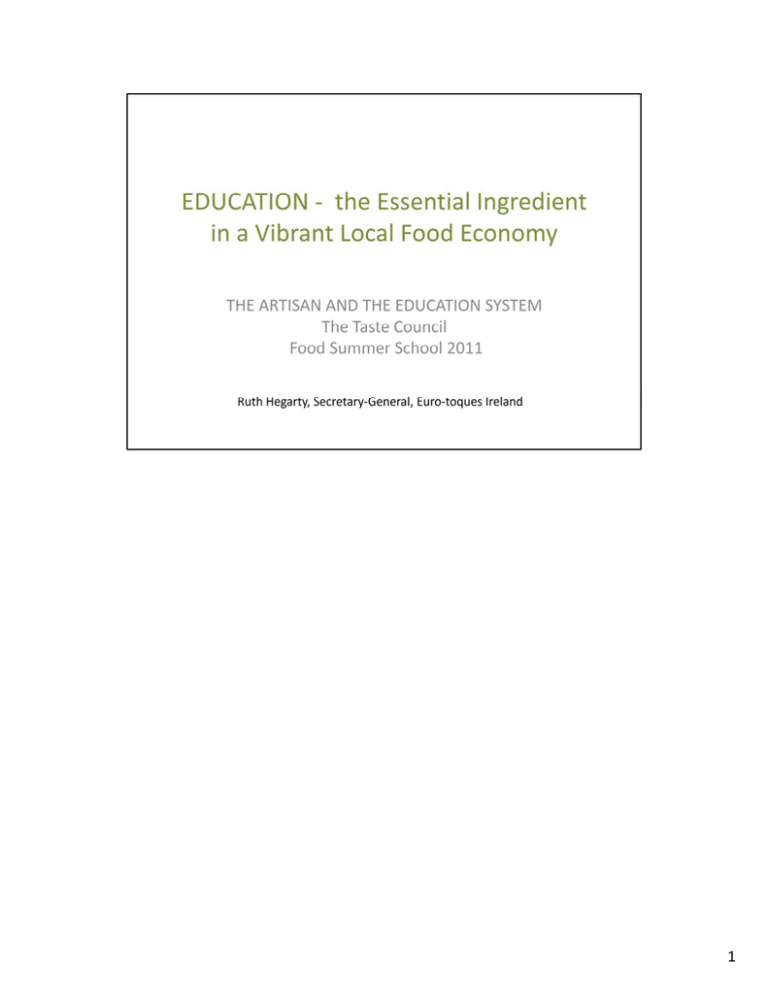
1 • The Taste Council have called this session ‘The Artisan and the Education System’ and this is their aim for the session……this is taken as the parameter of the presentation. Therefore, it will refer to Local and Artisan Food and will look specifically at Transition Year and relevant Third Level courses. • Although it will look at what the ideal world scenario would be, the presentation will attempt to look at what is achievable in the short to medium term. 2 FIRSTLY, FOOD IS CENTRAL TO OUR LIVES – for health & for pleasure Farmers, Food Producers & Cooks/Chefs are the people who feed us, and therefore should be looked at as highly valued careers. Is there a more important role? We have a lot of positives – not least the economic importance of the agri‐food sector. But those of us who are involved in the food industry, particularly the so But those of us who are involved in the food industry particularly the so‐called called ‘artisan’ artisan food industry, exist in a bubble. We must not fool ourselves about the state of our food ‘culture’. Don’t have a real ‘food culture’ – by this I mean, we don’t have a culture of constantly thinking about & discussing food, we don’t have a culture where people commonly recognise the difference but good and inferior food (across age and socio‐economic spectrums), we don’t have a culture in which people demand good food and feel they deserve to have the best. As well as a disconnect between consumers and food production, there is a disconnect between farmers and the market. Do not see themselves as food producers. Many agricultural products are sold at a loss, farms are not sustainable from a business perspective. Very very few people in Ireland who do not come from a farm family choose farming as a career. There is very little diversification on farms and little on‐farm farming as a career. There is very little diversification on farms and little on farm processing. Processors and Retailers are hugely powerful, but they will always refer to consumer choice. Clearly the Irish consumer does not make strong enough demands for high quality locally sourced food. 3 Will explain why I am not happy with the terminology being used, but why ‘local’ is probably the best of an unsatisfactory bunch. 4 The idea of Food Education is broad and encompasses many things. It also crosses over many disciplines. From the Euro‐toques perspective, in our work on Food Education, we have always firmly believe in a holistic approach. We believe it is wrong, and ineffective, to focus solely on nutrition and the idea of ‘healthy eating’, where people are told what they should and shouldn’t eat and perhaps ‘guilt‐ tripped’ into certain behaviours, which will not be sustained. Most important thing is to nurture and interest and pleasure in food – everything else will Most important thing is to nurture and interest and pleasure in food everything else will follow. ‘French Paradox’ has long been discussed and wondered at. The French eat many things which we are told detrimental to health; butter, cream, cheese, wine etc, but they do not get fat and do not suffer the same levels of dietary related diseases (heart disease, diabetes and so on) as people in the UK & IRL, for example. Many conclude that it be because the French ENJOY their food. They take pleasure in it and approach it with balance and consideration. Their priority is TASTE. Look at the countries we associate with strong Food Culture; we mainly think of the Mediterranean Italy, France, Spain, but the same applies in most Asian countries. Food is ever‐present, people ask each other what they have had for lunch, food is part of every celebration, every cultural event. celebration, every cultural event. At the centre of how all these cultures approach food is BALANCE – something which is a central governing principle in all Asian food and for any good chef or cook. This intuition around balance cannot be learned from a book!! And it can’t be learned through guilt or Food Pyramids. 5 FIRSTLY, A QUICK LOOK AT THE TERMS BEING USED EDUCATION here is a limited word, in that it evokes book learning. What we are talking about is a practical and, again, holistic appraoch. FOOD EDUCATION – incorporates agriculture – all the facets mentioned Local – implies being able to attain full knowledge of how and where the food was produced even the possibility of influencing that Within it, it contains the characteristics produced, even the possibility of influencing that. Within it it contains the characteristics of Seasonality & Sustainability Artisan – John McKenna 4 Ps Personality of the Produce, The Place it comes from, The Product provided and the Passion that goes into it. Talking about Skill, Know‐how, Terroir, Character, Responsibility for production often lies with an individual, or family REAL Yale Sustainable Food Project the intersection of many food movements; just, local, sustainable, organic, humane, and fair trade Other terms, ‘Fresh, Quality, Natural, Homemade’ much abused. REAL – maybe a little too pretentious for us REAL maybe a little too pretentious for us ARTISAN – can be perceived as specialised, even elitist What I am talking about is educating children, young people, all consumers about basic agricultural food products, Primary Produce – seasonal fruit & veg, properly reared meat, fresh sustainable fish. So artisan in the sense of people who are doing it the Right way, not luxury/gourmet produce. A di t ti t f d th t l l t t F d hi h i d th th 6 Food as relevant to everyone Food as pleasure Again, a balanced approach. 7 • Business & Economic reasons are many ‐ New Economic Foundation ‐ Every £10 spent in local food businesses is worth £25 to the local economy, compared with just £14 when same amount is spent in a supermarket. A pound or euro spent in a local business generates more than twice as much income for the local economy. When businesses are not locally owned, the money leaves the community ‐ Importance in overall economy ‐ Food & Beverage exports major contributor to strong expert performance – Artisan Foods important in marketing of Ireland. Food Harvest 2020 recognises that “the artisan sector has the potential to enrich Ireland’s tourism while, in turn, tourism can be a vehicle to enhance the image of Ireland and Irish food production internationally ‐ Entrepreneurialism, innovation, rural enterprise – seeds for the next generation of Irish food businesses ‐ Believe Irish competitiveness will be based on quality, differentiation – B li Iih ii ill b b d li diff i i need to show the d h h opportunities for specialisation • Environmental sustainability and our ‘Green’ image is seen as pivotal in the branding of Ireland on export markets. Must ensure we are not just marketing this image but also delivering it. Teaching principles of local and seasonal sourcing and small scale sustainable agriculture will provide our future farmers sourcing and small‐scale sustainable agriculture will provide our future farmers and food producers, as well as food buyers and consumers , with a better understanding of how food is produced and the real value/cost of food, and help them see the benefits of good stewardship of the land Food Harvest 2020 consumers in key markets will learn to recognise implicitly that, by buying Irish, they are choosing to value and respect the natural environment”. 8 Show that it makes business/economic sense – employment opportunities etc Change attitude towards food Change mind‐set towards careers in agriculture and cooking – Not for the person who wasn’t smart enough or didn’t work hard enough to get points for a ‘profession’. Not inferior to ‘professions’ or academic pursuits and should not become overly academic. Needs to be respected as a craft. The right people the right approach – enterprising, innovative thinkers, but based on The right people, the right approach enterprising innovative thinkers but based on quality approach. Farmers who want to add‐value and diversify, see themselves as food producers. Recognise their hugely important, essential role, in feeding people. Need high‐value, not commodity, ag. Artisan producers & Chefs who will contribute to a vibrant, diverse and high quality food culture. Not an ‘open the packet’ approach. Need more consumers who seek out quality sustainable food – demand, affect the power of the retailers. Breed a future regulatory environment more favourable to a vibrant food culture. ALL BENEFITS IRISH ECONOMY IN LONG‐TERM – mre likely to choose Irish food, higher value food value food 9 Selling Ireland on an image of green, small‐scale, quality agriculture. Recognition of the importance of food and agriculture to the economy, and indeed the contribution of artisan to this and to Ireland’s reputation. In Euro‐toques we have always recognised need for 2 streams of agriculture/food production, but believe Ireland’s selling point will be quality (can’t compete on volume/price). Fantastic to see official recognition of need for differentiation, can’t concentrate solely on commodity markets and scale. We need to be unique We need to be unique. At State level, clear drive to promote ‘local food’, both from point of view of domestic market for our food/ag products and from Tourism perspective. Also, promotion of idea of on‐farm diversification and rural business development at official level. 10 Also, a plethora of other non‐governmental bodies working on similar areas. Many of these have Educational Projects & activities 11 Schools have changed a huge amount since most of us were there – don’t underestimate this. Things have definitely improved in relation to awareness of environmental issues, food & farming, healthy eating etc. Exisitng ‘Food Education’ activities in schools take many different formats. Some of the specific initiatives that already exist Govt – Food Dudes Food Dudes – much more to food education that nutrition/healthy eating. much more to food education that nutrition/healthy eating Again, need to take broader approach – where food comes rom. How it grows, the pleasure of cooking and eating 12 The number of different bodies involved in Food Education and no of different initiatives in existence shows there is undoubtedly agreement around the need for Food Education and don’t think anyone would dispute this. BUT NO OFFICIAL POLICY, NO STRATEGY. Everyone working on their own with limited resources. Need COHERENCE. Need a VISION of what we want the future to look like and how Food Education fits into this. Then we need a STRATEGY and ACTION 13 In an Ideal World – start as early as we possibly can. All about Taste – educate the palate. In fact, if we are serious about Taste Education and broadening the palates of our children, we need to start with new born babies. Better promotion of Breastfeeding is the first step to better eating in future. Introduces range of flavours from day one, avoids ‘dumbing down’ the palate. Then throughout the national school curriculum, an overriding theme – school gardens, tastings visits to restaurants and farms tastings, visits to restaurants and farms But for today, we are looking at The Low Hanging Fruit – TRANSITION YEAR – easy to access, appropriate and flexible Absolute Necessity for Immediate Action – THIRD LEVEL (no‐brainer to introduce trainee foodservice industry to local‐sourcing) 14 What we can achieve just by addressing these areas. In a 3 year period, access and influence almost 100,000 farmers, food producers, chefs, regulators, policy‐makers, inspectors and BUYERS/CONSUMERS/CUSTOMERS who will be entering the marketplace in the very near future 15 Food Education fits perfectly with the ethos of TY. The Format Core Subjects (English, Maths, Irish and so on) Taster Subjects (try out other Senior Cycle subjects) TY Specific Modules (Called TY Units, these are the way other non‐academic areas are introduced in TY. Some units carry certificates) Calendar Events (Field Trips Guest speakers etc) Calendar Events (Field Trips, Guest speakers etc) Schools can introduce any approved TY units they like, or create their own. And these can change from year to year. Very flexible. Strong Emphasis on Enterprise, innovation, business start‐up. Review of Curriculum and Assessment currently under way. BUT the fact that every school devises their own programme they cannot (as it stands) be forced to deliver a particular unit. 16 But need Buy‐in from Government and agencies. Needs to be promoted as part of a long‐term strategy to support & develop farming, food production, tourism, catering & small business 17 Introduce a TY Unit encompassing these themes, and also Calendar Events to compliment – visiting chef/food producers/farmers, visits to farms & restaurants. If every Secondary School student was brought to eat in a top restaurant, I have no doubt that it would result in more choosing careers in food 18 Whole mind set around how we train farmers, food producers and chefs needs to change. Yes, we need thinkers, but they are useless if we have no practitioners left. These are Crafts, Skill‐based. Let people learn the craft first. They can theorise later. Need to ask if CAO is correct route for these? A course becomes popular, points go up and next thing you know you need 500 points to train as a chef. What has happened to apprenticeships? Why has this become a dirty word? At the same time as Artisans have been calling for the creation of apprenticeship programmes for artisan food production apprenticeships are being done away with for programmes for artisan food production, apprenticeships are being done away with for chefs. Need to look at content, teaching methods and inputs for both Ag Science and Culinary Arts – Food production straddles the two, not many courses specifically on this. Also, need to include in this how we educate EHOs, Agricultural inspectors etc. WE need to think about our vision for the future. Are we planning for this vision? From Euro‐toques perspective our area of Culinary Arts/Chef Training, so concentrate on this: If we can’t teach trainee chefs about local sourcing and if we don’t use locally‐sourced ingredients in our chef courses, we are we headed with campaigns like Just Ask and Place on Plate. How are we developing the future of our culinary sector? on Plate. How are we developing the future of our culinary sector? Don’t forget the importance of chefs in championing our artisan producers and in building (even creating) a country’s food reputation (Think Ferran Adria of El Bulli in Spain and Rene Redzepi of Noma in Denmark). Chefs have to set the standard. Procurement in our Third Level insistutes is a disgrace. Even the ingredients used in the t i i f h f (f d d ti l ) C ’t hid b hi d bli t l 19 20 Commitment to form an industry/education working group to devise a Transition Unit on Local & Artisan Food To deliver a Transition Year Support Service Course to Transition Year Coordinators, Home Ec Teachers, Business teachers etc on this unit To provide appropriate contact and resources to schools to arrange ‘Calendar Layer’ activities relating to this unit (ie. List of businesses or relevant orgs to arrange farm visits, guest farmers/artisan producers/chefs, restaurant visits etc) and to strongly publicise and promote this Transition unit option to schools and teachers, highlighting how it is aligned with future economic plans and strategies 21 22 We don’t see Teenagers in restaurants. In any healthy food culture, teenagers (and of course children) go to restaurants with the friends and their families. How can we start seeing this happening in Ireland? Vision 23 24
